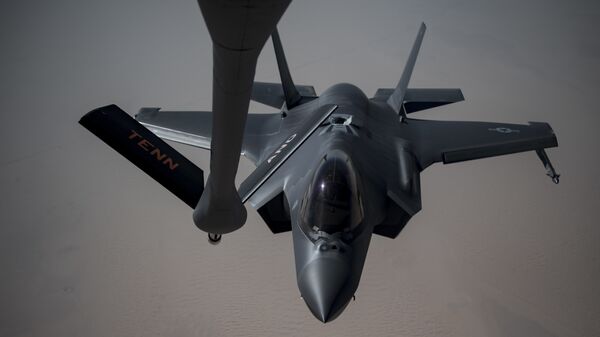The Pentagon has deployed a squadron of F-35A Lightning stealth fighters to an Italian airbase to take part in drills as part of a European Theatre Security Package (TSP) mission.
The aircraft are from the 388th and 419th Fighter Wings, stationed at Hill Air Force Base in Utah, and have been deployed to NATO's Aviano Air Base in north-eastern Italy.
The F-35s and members of the 421st and 466th Fighter Squadrons arrived at the base on 24 May and will remain in Europe for several weeks, the US Air Force said in a press release.
"Funded through the European Deterrence Initiative, the TSP provides a more robust US military rotational presence in the European theatre capable of deterring adversaries and assuring partners and allies of US commitment to regional security," said Lt. Col. Richard Orzechowski, 421st Fighter Squadron commander.
This is the 388th Flight Wing's second mission to Europe, following a mission in England in April 2017. "The 421st FS is the newest F-35A squadron and this is their first deployment with the multi-role stealth fighter," the officer noted.
The European Deterrence Initiative (EDI), prior to 2017 known as the European Reassurance Initiative, is a US defence welfare programme launched under President Obama in 2014, shortly after the re-unification of Crimea with Russia, with the purpose of building up the US presence across the Atlantic and bolstering the defence of its European allies.
This year, the United States' $750 billion defence budget included $6.3 billion for the EDI — a seven-fold increase from $789 million in fiscal year 2016. The Pentagon's request for next year, which is yet to be approved in Congress, indicates a slump in funding for the European theatre, coming in at $5.9 billion.
Washington has been enlarging its military footprint in Europe since the outbreak of the Ukrainian crisis, particularly as part of NATO. US President Donald Trump, meanwhile, has been pushing the allies to boost their defence budgets.
NATO has been consistently strengthening its posture on the eastern flank, including in Poland and the Baltic states, citing an alleged "Russian threat". The military bloc's chief, Jens Stoltenberg, warned in April of a risk posed by "a more assertive Russia", claiming that Moscow "has made the world a more dangerous place".
Last week, it was reported that NATO had adopted a new military strategy in response to what Stoltenberg described as "Russia's nuclear threat".
The Kremlin has underscored that Russia poses no threat to other nations, but will not ignore actions which endanger its interests. Russia repeatedly voiced concerns that NAto used the pretext of the alleged threat to deploy more equipment and troops along its borders.
Meanwhile, amid mounting tensions with Iran, the United States is seeking to forge a similar alliance in the Middle East. The Middle East Strategic Alliance, commonly referred to as "Arab NATO", is an initiative first suggested by the Arab League in 2015, which is designed to include Gulf Arab states, and Egypt and Jordan.
READ MORE: Moscow Says Possible Creation of 'Arab NATO' to Counter Iran a 'Dangerous Path'



